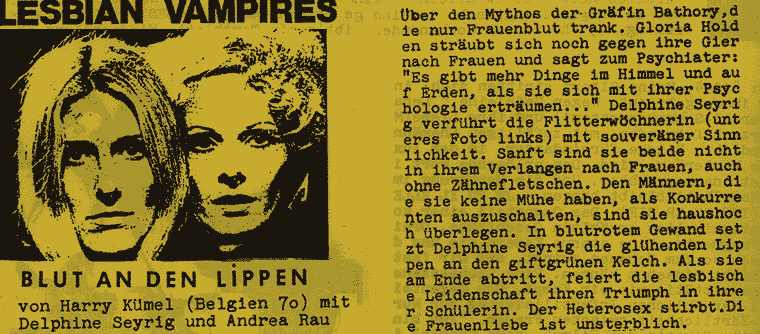|
____"We
called the cinema Sputnik"
In the mid-eighties we were running a big
old cinema from the fifties collectively. It was situated
in Wedding, the workers district of Berlin. The cinema was
previously owned by a Turkish entrepreneur who had wanted
to show Turkish films there. We called the cinema Sputnik,
after our pre-Gorbachev anti-cold-war ideas. I was the only
female member of this collective. A friend. Maria Schmidt
approached me with the idea to organise a film programme with
her for the first lesbian week in Berlin (1985). We viewed
many films and edited together a one hundred minute compilation
at Bildwechsel ( awomen`s media centre in Hamburg) we called
it Clichès - Lesbians in Film, from modified Vito-Russo-position.
Over the week we screened films such as Madame
X by Ulrike Öttinger, Olivia by Jacqueline Audry ( wich
we got from Circles); je, Tu, Il, Elle by Chantal Akerman,
and some experimental films, the 1972 Near the big Chakra
by Anne Severson. We had declared the cinema a ladies-only
place, and every night the cinema was packed. We had the idea
of creating a seperatist voyeuristic space, and trained several
women as projectionists. Our vampire film night ended with
the strange and special Daughters of Darkness by belgian
filmmaker Harry Kümel, starring Delphine Seyrig as
the contemporary vampire seductress, speaking with her soft,
warm voice and using some vocabluary of the women´s
movement.
When I was projecting the film I noticed
some women from the audience jumping on the stage and trying
to cover the six metre creen with the jackets and trying to
draw the big green stage curtains. Some women came up to the
projection booth and ask me to stop the film. I told them
that they should be patient with the development of the plot,
wait for the aggressive bridegroom of the blonde bride to
be killed and Countess Barthory (Delphine Seyrig) to continue
her elegant seduction of the bride. But the tumultuous incidents
continued and I stopped the film and went down to help my
colleague Maria. I was afraid they would destroy the cinema.
Some women were almost physically fighting, some were saying
they didn`t want to see heterosexual vilence during lesbian
week, and others were saying they didn´t want censorship.
As Maria and I stood completely speechless, Ulrike Ottinger
jumped onto the stage to give a speech to the audience about
how they should continue to watch the film, for Delphine Seyrig
had probably done more for the women´s movement than
many memers of the audience. I told the women who wanted to
get their money back "to buy back their lesbian innocence"
if they felt like that. This was atime when many such incidents
occurred.
Issues of representation identity and identification
were questioned, even to the point that some women rejected
the notion of the soft and peaceful essential character of
women. The lesbian SM movement also caused some reasons for
heavy debate. In Germany Andrea Dworkin´s pornography
debate was featured in the biggest mainstream feminist magazine,
Emma. When I travelled to Britain some years later, 1989,
I heard that the film She must be seeing thingd by Sheila
McLaughlin had provoked a split in the lesbian summer camp,
and in Manchester there had even been a bomb threat against
a cinema showing that independent and ironic film.
Madeleine Bernstorff in: "A political
feeling, I hope so",
+ film programme with Emma Hedditch, at Cubitt gallery, London,
2004
|
